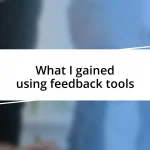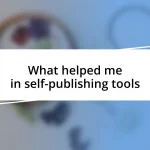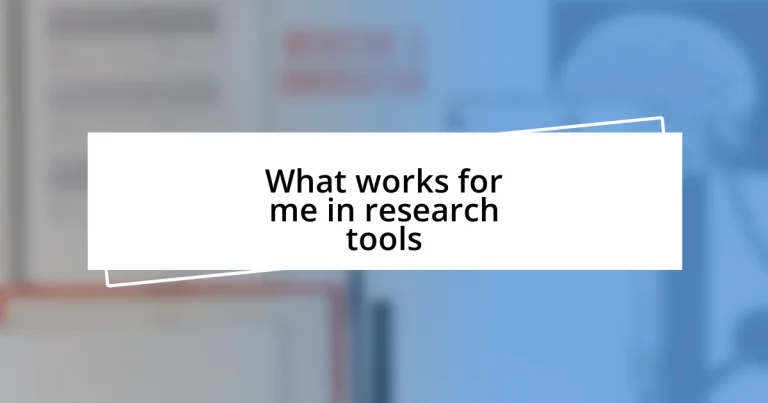Key takeaways:
- Establishing clear research goals simplifies the inquiry process and enhances efficiency and passion in the work.
- Integrating and selecting research tools that align with individual workflows fosters creativity and productivity while avoiding frustration.
- Continuous learning and adaptation to new technologies and methods can lead to breakthroughs and improved research capabilities.
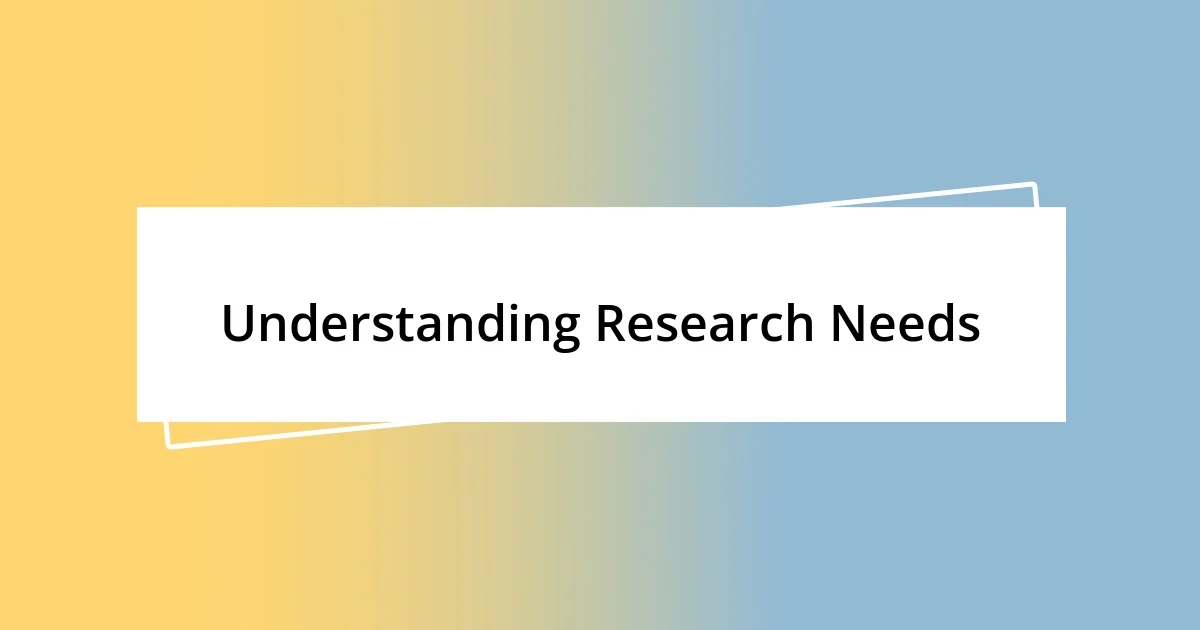
Understanding Research Needs
Understanding research needs is a deeply personal journey for each researcher. I remember the first time I dived into a project, feeling overwhelmed by the sheer volume of information and wondering how I would ever find what was relevant. It’s in those moments of uncertainty that I realized the importance of clarity—knowing exactly what I’m looking for can dramatically simplify the process.
It’s fascinating how research needs can evolve as you delve deeper into a topic. I once started with a broad question but soon found my focus shifting as I connected with different aspects of the subject. Have you ever experienced that moment when a tiny detail in your findings lights a spark? That’s when I knew I had to adjust my approach to fit my growing curiosity, illustrating just how fluid our research priorities can be.
Ultimately, understanding what you need from your research is about establishing a clear purpose. Setting specific goals can guide your inquiry and help you sift through resources more effectively. Think about it—when was the last time you engaged in research without a well-defined objective? I can assure you, having that clarity not only improves efficiency but also ignites passion in the work you’re doing.
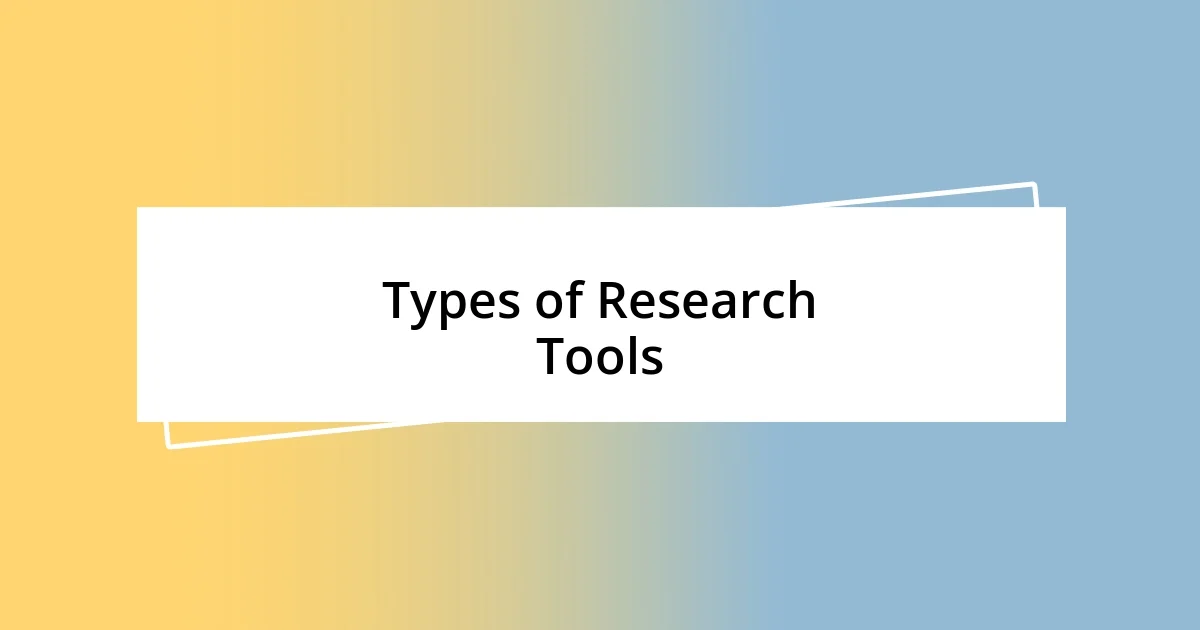
Types of Research Tools
Understanding the diverse types of research tools available can significantly enhance the efficiency and effectiveness of any research project. During my own journey, I’ve found that using a mix of different tools caters to various stages of research. For instance, while diving into literature reviews, I often turn to academic databases and citation managers to streamline the process.
- Academic databases (like JSTOR or PubMed) for peer-reviewed articles
- Citation managers (such as Zotero or EndNote) for organizing research sources
- Survey tools (like SurveyMonkey or Google Forms) for gathering original data
- Note-taking applications (like Evernote or Notion) for capturing insights
- Collaboration tools (like Mendeley or Microsoft Teams) for teamwork and feedback
Every tool serves its own purpose, and I remember the first time I leveraged a survey tool for my research. It felt empowering to collect firsthand data, directly reflecting the audience’s perspective. This experience opened my eyes to the potential insights hidden within community feedback, and now, I make it a priority to include diverse voices in my research approach.
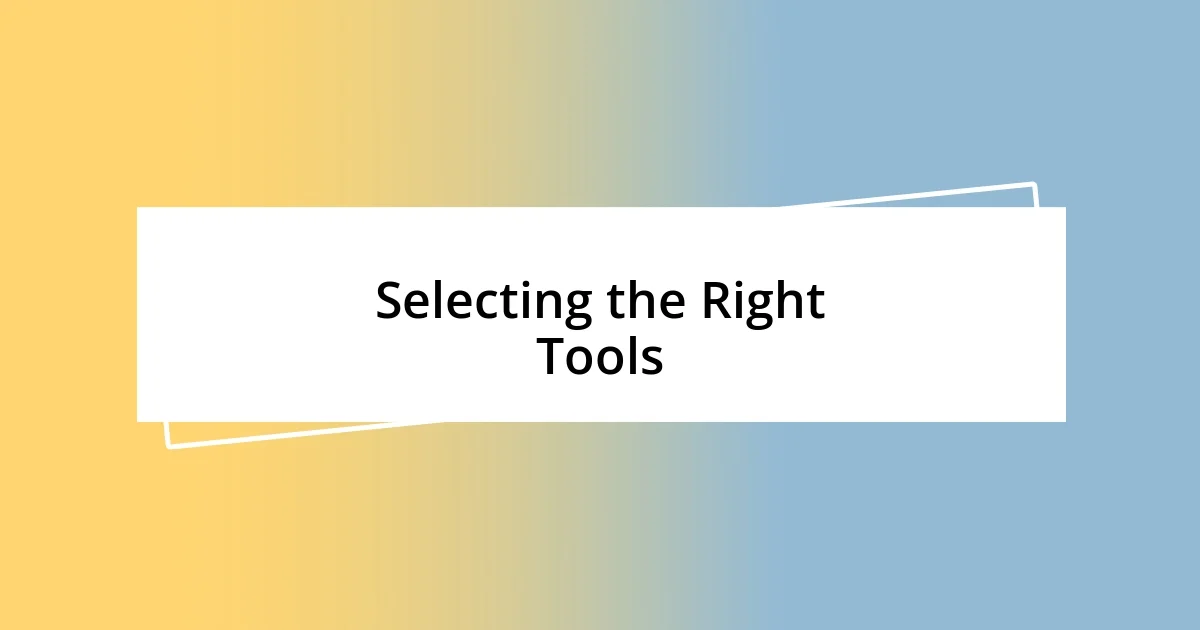
Selecting the Right Tools
When selecting the right tools for research, it’s crucial to consider your unique needs and goals. As I explored different platforms, I found that the most effective tools are those that mirror my workflow. For example, I had a moment of clarity when I switched from a generic research platform to a more specialized one tailored for my subject area. That shift not only saved me hours of frustration but also enriched my findings.
It’s easy to get lost in the vast options available, but I’ve learned to prioritize simplicity and compatibility. One time, I invested time in a complex software that promised the world but ended up being a cumbersome experience. Sometimes, the most value comes from tools that seamlessly integrate into existing processes. It’s all about what makes the most sense for your individual style and project demands.
To make the best decision, I encourage you to experiment with a few tools before settling on the ideal combination. I often set aside time to play around with new software—or even revisit familiar ones—to see if they can enhance my workflow. Trust me, it’s a worthwhile investment that can lead to breakthrough moments in your research journey.
| Tool Category | Pros |
|---|---|
| Academic Databases | Access to peer-reviewed literature |
| Citation Managers | Simplifies organization and referencing |
| Survey Tools | Enables first-hand data collection |
| Note-Taking Applications | Efficient insights capture |
| Collaboration Tools | Enhances teamwork and feedback |
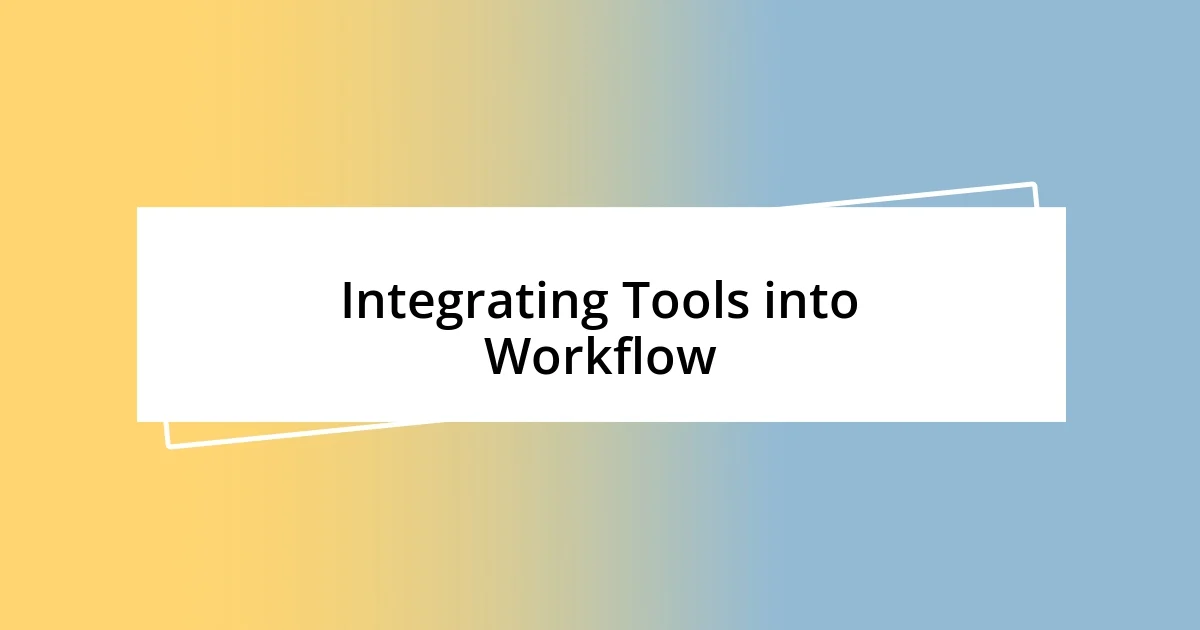
Integrating Tools into Workflow
Integrating tools into my research workflow has often felt like assembling a puzzle. Each tool I adopt brings a unique piece that, when fitted together, creates a clearer picture of my project. I remember a time when I was juggling multiple platforms for different tasks—finding it overwhelming to switch contexts constantly. By integrating a note-taking app with my citation manager, I found a rhythm that let me capture ideas on the fly, leading to those ‘aha’ moments of insight when everything clicks into place.
One of the pivotal changes I made was integrating collaboration tools early in the drafting process. Instead of waiting until I was done to seek feedback, I started sharing my evolving thoughts with peers. This shift not only provided immediate input but also fostered a sense of camaraderie that made the entire process enjoyable. Have you ever tried involving others from the start? The collective brainstorming often sparks ideas I would never have considered alone, enriching my research in ways I hadn’t anticipated.
I also encourage you to reflect on the emotional impact of your workflow. Frustration and stress can easily creep in if tools don’t mesh well with your style. I learned this the hard way when I stubbornly clung to a popular software that didn’t communicate well with my other tools. Wasting time on unnecessary tech headaches was a wake-up call. Now, I focus on integrating tools that enhance my workflow, allowing creativity to flow rather than be stifled by cumbersome processes. It’s liberating to feel in control!
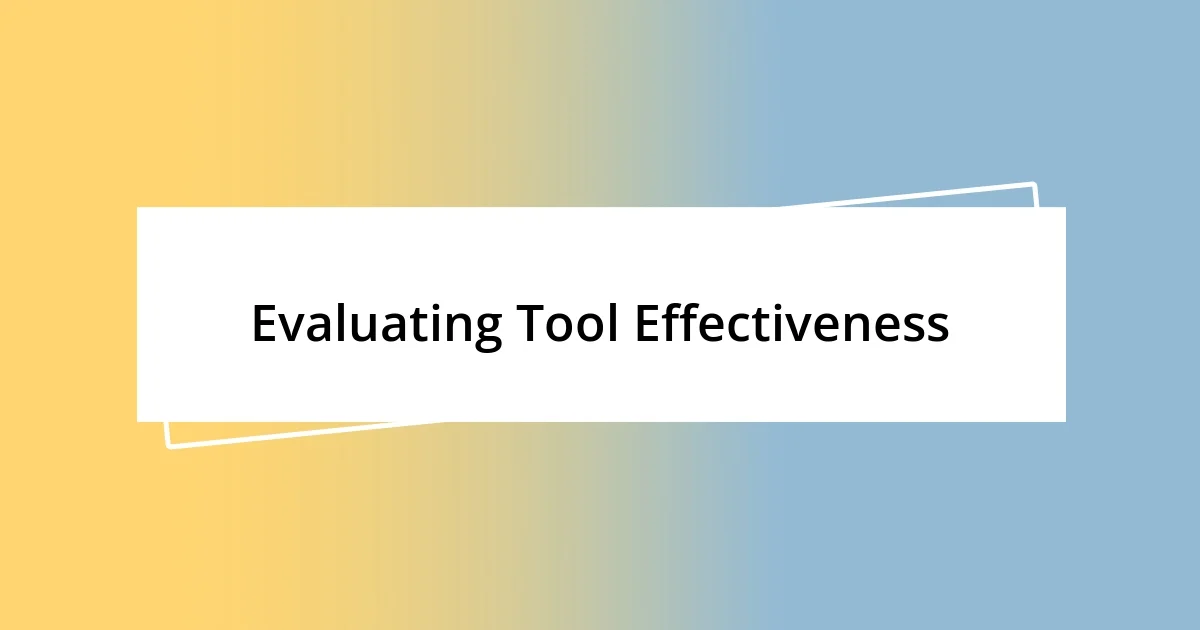
Evaluating Tool Effectiveness
Evaluating tool effectiveness starts with clarity about what you need. I recall testing a promising data visualization tool that claimed to enhance my analysis. However, after a few frustrating attempts to tailor it to my needs, I realized it simply wasn’t aligning with my methodologies. Has that ever happened to you? Knowing what works and what doesn’t can be an enlightening journey.
Another aspect I focus on is user feedback. When I tried a new citation manager, I dove into forums and social media groups to gauge experiences from other users. Witnessing a consistent pattern of complaints about its syncing feature made me pause. This informal research taught me the importance of community insights in evaluating effectiveness—avoiding future missteps is a precious time-saver.
Ultimately, performance metrics matter. A few years ago, I adopted a note-taking app that promised to boost my productivity. Initially, it seemed fantastic, but after tracking my output over several months, I noticed no real improvement. That realization was a turning point for me, reinforcing the need for tools that genuinely enhance my workflow rather than simply adding to the noise. How do you measure effectiveness in your tool choices? Let your results guide the way!
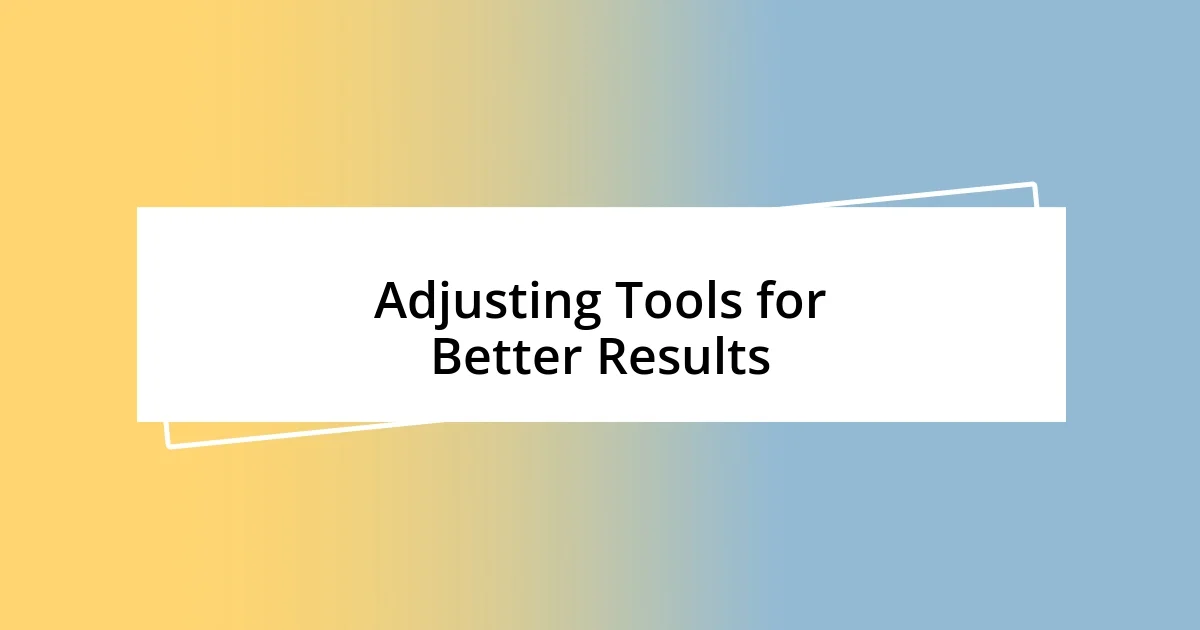
Adjusting Tools for Better Results
Adjusting tools for better results involves a significant bit of experimentation on my part. For instance, I’ve played around with keyboard shortcuts in my writing software, discovering that these small tweaks can save me precious time. Have you ever found yourself bogged down by repetitive tasks? I realized that minor adjustments, like creating custom templates, not only streamline my process but also spark creativity by allowing me to focus on the content rather than the mechanics.
I also make it a habit to revisit my digital workspace regularly. A few months ago, I rearranged how I categorized my research files, shifting from a broad to a more thematic organization. This adjustment made it easier for me to locate and reference materials quickly. The relief I felt during a recent deadline was palpable—it’s amazing how a simple reorganization can enhance efficiency. Have you thought about how your setup might impact your workflow?
Lastly, I can’t stress enough the importance of continuous learning in this context. I enrolled in a webinar about digital tools for researchers, and it opened my eyes to features I’d never considered. Imagine discovering a hidden gem in your favorite tool that could potentially revolutionize how you work! These moments remind me that adjusting tools isn’t just about what’s currently effective; it’s about evolving with the tools and pushing the boundaries of what’s possible in my research journey.
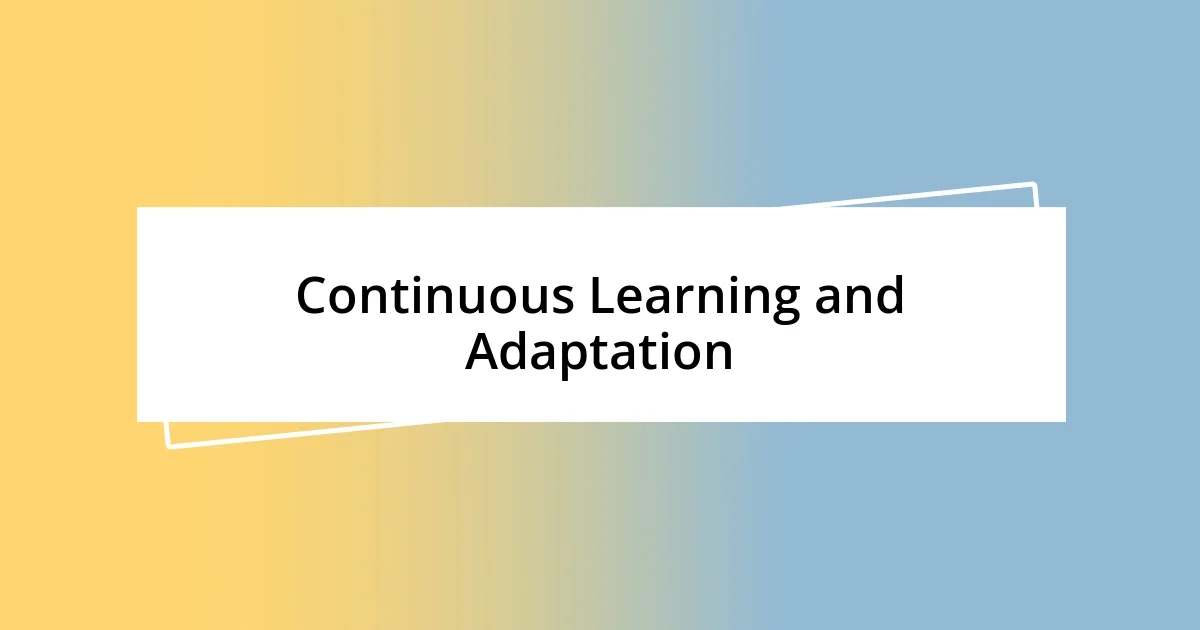
Continuous Learning and Adaptation
Continuous learning is an ongoing journey, and I’ve personally found it to be one of the most rewarding aspects of using research tools. For instance, the moment I immersed myself in a complex tutorial about data analysis software, I was both excited and overwhelmed. Yet, that feeling of uncertainty was quickly replaced by a sense of empowerment as I began to master new features. Have you ever experienced that exhilarating rush of understanding something that once felt out of reach? It’s those moments that keep my motivation alive and propel my research forward.
Adapting to new technologies also requires a mindset open to change. I remember the first time I integrated a project management tool into my workflow. Initially, it felt like just another item on my to-do list, but as I explored its capabilities, I grew to appreciate how it transformed my approach to collaboration. I started using it not just for tracking projects but also for brainstorming ideas and sharing responsibilities. Can you relate to the trepidation that comes with adopting new methods? Embracing flexibility in my toolkit has often led me to discover better ways of working.
Moreover, I find it essential to connect with my peers regularly. I recently attended a workshop where colleagues shared their favorite learning resources. One participant mentioned a blog that detailed the latest trends in research tools, and I found some invaluable insights that changed my perspective. It’s fascinating how a simple conversation can spur ideas that may fundamentally alter how we engage with our tools. How often do you seek advice from others to enhance your own learning? These interactions remind me that the path of adaptation is not a solitary pursuit; it benefits greatly from shared knowledge and experiences.



